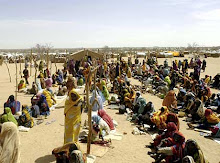The request from the International Criminal Court prosecutor for an arrest warrant for Omar al-Bashir, Sudan’s president, caused much hand-wringing by diplomats and others who say the search for justice will derail peace negotiations or endanger humanitarian relief workers. Fearing that the crisis in Darfur will worsen if the prosecutor is allowed to proceed, they have launched an ill-considered campaign at the United Nations Security Council to delay the court’s proceedings, perhaps for a year. The very nations that created the ICC appear to be afraid to let it do its work. A vote for deferral might come as early as next month.
For me, this is familiar terrain. When Radovan Karadzic and General Ratko Mladic, the Bosnian Serb leaders, were indicted by the Yugoslav tribunal in July 1995 for orchestrating atrocities in Bosnia, the media and many diplomats lamented that we would be unable to negotiate peace for Bosnia. Less than five months later, an agreement was reached in Dayton to end the war.
What had seemed an insurmountable obstacle turned out to be an unexpected opportunity. Before the indictments, we had already decided to marginalise Gen Mladic and Mr Karadzic and force Slobodan Milosevic, the Serbian president, to take full responsibility for the war. Our negotiating team met them only once – in a hunting villa just outside Belgrade in September 1995 – but only with a prior understanding that Mr Milosevic would be responsible for their conduct, and only to lift the three-year siege of Sarajevo, which we accomplished that night. Later, when Mr Milosevic insisted that to achieve peace the two men had to participate in negotiations, I offered to arrest them personally if they set foot in the US. Read more >>>>>>>>>>>
Wednesday, September 24, 2008
UN rights body renews job of Sudan investigator
GENEVA, Sept 24 (Reuters) - The United Nations Human Rights Council on Wednesday renewed the mandate of its specialist on the Sudan for six months despite charges from Khartoum that she was working with the West to besmirch the country's image.
Diplomats said the consensus decision among the body's 47 members was part of a compromise between mainly European states and Islamic and African nations that softened EU-proposed criticism of the Sudanese government's rights record.
Sima Samar, formally the Council's special rapporteur, had angered Khartoum and its allies with a strongly worded report this month contradicting Sudanese assertions that the rights situation was improving, and saying it was in fact grim.
She said government and rebels were killing civilians in Darfur and accused Khartoum's forces of launching deadly ground and air attacks in the region, the scene of 5 years of violence that international experts say has killed some 200,000 people. Read more >>>>>>>>>>
Diplomats said the consensus decision among the body's 47 members was part of a compromise between mainly European states and Islamic and African nations that softened EU-proposed criticism of the Sudanese government's rights record.
Sima Samar, formally the Council's special rapporteur, had angered Khartoum and its allies with a strongly worded report this month contradicting Sudanese assertions that the rights situation was improving, and saying it was in fact grim.
She said government and rebels were killing civilians in Darfur and accused Khartoum's forces of launching deadly ground and air attacks in the region, the scene of 5 years of violence that international experts say has killed some 200,000 people. Read more >>>>>>>>>>
Friday, September 12, 2008
'Nieuw soort regeringsgeweld in Darfur'
DEN HAAG - Het Sudanese regeringsleger gebruikt een nieuw soort geweld in de regio Darfur. Zo is in augustus het vluchtelingenkamp Kalma overvallen. Er werden granaten tussen de burgers gegooid en militairen "schoten midden in de gezinnen". Er vielen "tientallen doden".
Dit heeft hoofdaanklager Luis Moreno Ocampo van het Internationaal Strafhof (ICC) vrijdag gezegd tegen het ANP. De Argentijn onderzoekt oorlogsmisdaden in Darfur in opdracht van de VN-Veiligheidsraad.
Subscribe to:
Comments (Atom)
